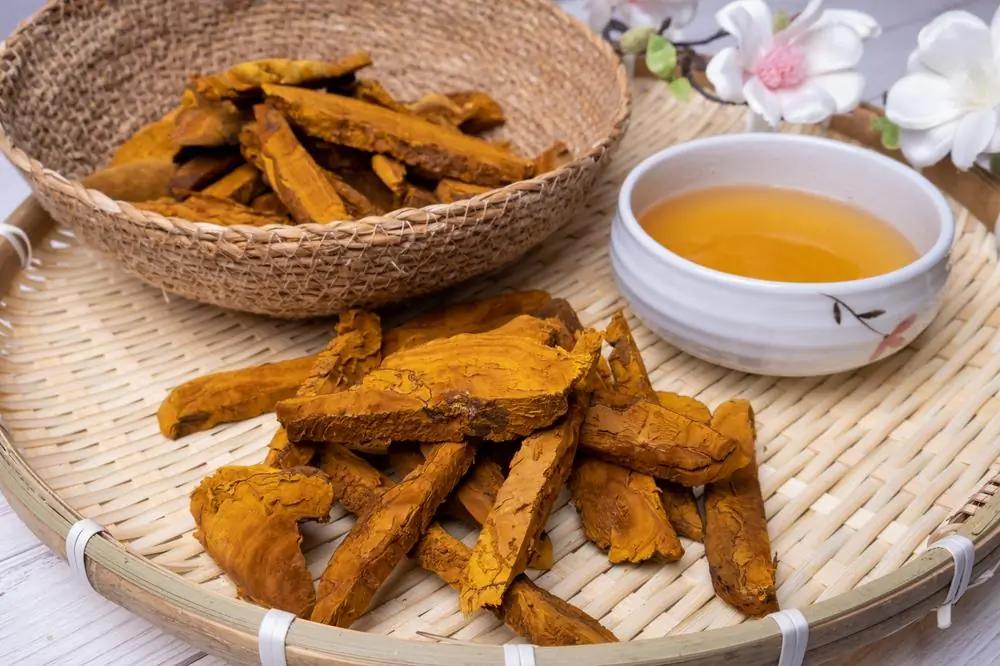Cancer poses a global challenge, and though some may be cured depending on various factors, there isn’t any one cure for the disease. This is especially evident in advanced-stage cancers, where patients often suffer in pain during their final days. As the search for cancer remedies continues, let’s explore three remarkable case reports involving the use of a medicinal mushroom called Phellinus linteus (Sanghuang) in cancer treatment.
In Japan, a 79-year-old man sought medical attention due to upper abdominal discomfort and received a diagnosis of liver cancer accompanied by multiple lung metastases. He did not undergo any treatment but chose to self-administer Sanghuang for one month. Six months later, the tumors appeared to have completely regressed, even though late-stage liver cancer is typically considered incurable.
A 68-year-old prostrate cancer patient was suffering from advanced prostate cancer that had developed resistance to all hormonal and radiation therapies, with multiple tumors spreading to his bones and bladder. Currently, there are no apparent effective treatments for hormone-refractory prostate cancer. After exhausting all other options, the patient began taking Sanghuang, and experienced a “dramatic remission,” with no cancer recurrence since then.
In another case, a 65-year-old Korean man was diagnosed with hepatocellular carcinoma (liver cancer), with cancer cells having metastasized to his frontal bone. The patient declined other recommended treatment methods but, due to the pain in the frontal bone, he opted for radiotherapy and began taking Sanghuang for a year and a half. In a rare demonstration of spontaneous regression, both the liver and frontal bone tumors regressed.
Cancer is a leading cause of death worldwide. Despite the extensive use of various chemotherapeutic drugs in cancer treatment, current anticancer medications can cause severe side effects and induce drug resistance. Therefore, the development of novel and effective anticancer agents with minimal or no side effects is of paramount importance.
Sanghuang is a well-known medicinal mushroom in Asian countries. Since ancient times, people have consumed Sanghuang orally as a health-promoting dietary supplement and as an adjunct therapy against viral and bacterial infections. Sanghuang contains various bioactive components, demonstrating anticancer, anti-inflammatory, antioxidant, immunomodulatory, and antifungal activities. Additionally, it also exhibits antidiabetic, hepatoprotective, and neuroprotective effects.
Potential Effective Treatment for Several Types of Cancer
Numerous studies have found that Sanghuang exhibits potential therapeutic effects on various cancers, including breast cancer, prostate cancer, and lung cancer, through multiple mechanisms.
In a study published in the Journal of Clinical Medicine Research in 2015, researchers analyzed the effects of Sanghuang extract, specifically PL-ES and PL-I-ES, on ten different human cancer cell types. These cancer types included three forms of metastatic prostate cancer, liver cancer, brain cancer, breast cancer, lung cancer, stomach cancer, kidney cancer, and bladder cancer.
The results revealed that PL-ES and PL-I-ES exhibited anticancer effects on multiple cancer cells, with PL-ES causing significant growth reduction in all ten cancer cell types within 72 hours. Researchers attribute this anticancer effect to oxidative stress, which ultimately leads to apoptosis in cancer cells. Hence, these two bioactive components of Sanghuang are considered to hold clinical significance for a more effective therapeutic option in various human malignancies.
1. Breast Cancer
A study published in the British Journal of Cancer indicated that the extract of Sanghuang, a natural compound, can inhibit the proliferation, invasive behavior, and angiogenesis of aggressive human breast cancer cells. This inhibition can suppress cancer metastasis, further increasing the survival rate of breast cancer patients. This suggests that Sanghuang holds potential therapeutic effects for invasive breast cancer.
2. Prostate Cancer
Another study published in the British Journal of Cancer found that Sanghuang serves as an apoptosis sensitizer for traditional chemotherapy drugs like doxorubicin in prostate cancer cells, preventing harm to surrounding normal cells. This also suggests that Sanghuang, as a safe alternative, has the potential to become a more effective therapy method for drug-resistant prostate cancer.
3. Lung cancer
A study published in the Molecular Carcinogenesis journal also revealed that high concentrations of Sanghuang can induce apoptosis in both mouse and human lung cancer cells, while low concentrations of Sanghuang lead to cell-cycle arrest. Furthermore, low-dose Sanghuang can synergize with the anticancer drug doxorubicin to trigger apoptosis in lung cancer cells.
4. Leukemia
In a study published in The American Journal of Chinese Medicine in 2013, it was found that Hispolon, a phenolic compound isolated from Sanghuang, can induce both intrinsic and extrinsic apoptosis pathways in NB4 human leukemia cells in vitro.
5. Melanoma
Another animal experiment indicated that the acidic polysaccharide in Sanghuang, as a cancer-fighting immunostimulator, can activate macrophage functions. Additionally, it can directly inhibit cancer cell adhesion to and invasion through the extracellular matrix, effectively suppressing melanoma cell metastasis.
Other Health Benefits of Sanghuang
In addition to cancer treatment, scientific evidence has also confirmed Sanghuang’s anti-diabetic and anti-inflammatory effects.
1. Lower Blood Sugar and Lipid Levels
A study published in the journal Nutrients in 2019 reported that researchers, using a Type 2 diabetic rat model, found that Sanghuang extract treatment effectively lowered blood sugar levels, improved insulin resistance, as well as lipid and lipoprotein profiles. Additionally, it demonstrated strong protective effects on the liver and kidneys.
The research suggested that Sanghuang extract has the potential to serve as a functional food for adjunctive treatment of Type 2 diabetes accompanied by dyslipidemia (abnormal lipid levels).
2. Prevent COVID-19 Infection
The COVID-19 pandemic is still ongoing, and it has been discovered that the mechanisms of viral infection include the binding of the SARS-CoV-2 virus’s spike protein to ACE2 (angiotensin-converting enzyme 2), enabling the virus to enter cells. Additionally, SARS-CoV-2 is facilitated in cell entry after modification by TMPRSS2 (transmembrane protease serine 2). Therefore, ACE2 and TMPRSS2 are crucial targets for preventing SARS-CoV-2 infection.
A cell and animal experiment published in Biomedicine & Pharmacotherapy in September 2022 revealed that Sanghuang and its phenolic compounds can significantly reduce the expression of ACE2 and TMPRSS2, thereby inhibiting the entry and replication of SARS-CoV-2. Additionally, it does not cause any cytotoxicity or organ damage.
3. Improve Knee Osteoarthritis
Knee osteoarthritis is the most common form of arthritis, primarily caused by degenerative damage to the cartilage that cushions the joints, leading to pain and inflammation.
In a clinical trial conducted in South Korea, 24 knee osteoarthritis patients participated in an 8-week treatment and observation. The results showed that patients who took 1,500 mg of Sanghuang extract daily experienced greater improvement in symptoms compared to the placebo group, and no adverse events related to Sanghuang were reported.



